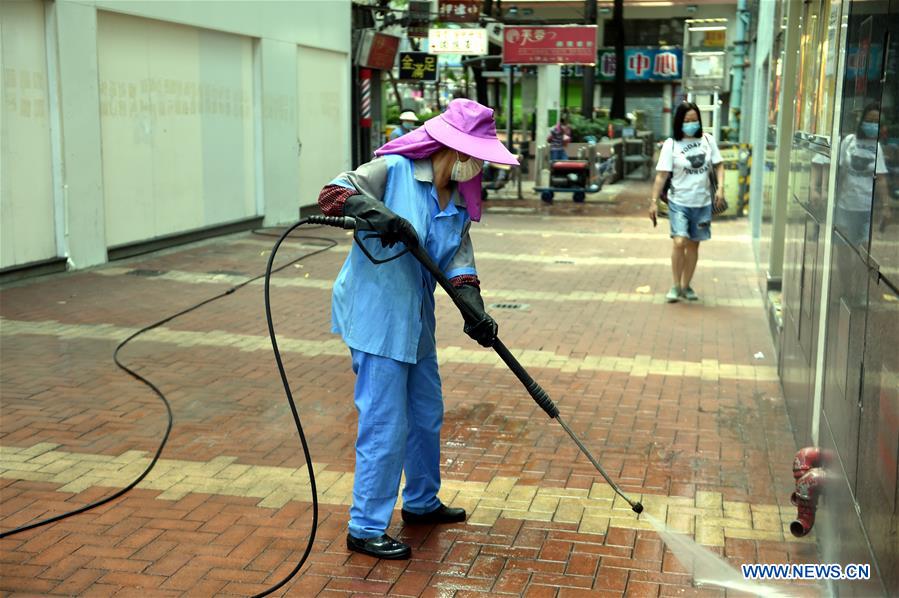Hong Kong stressed out as COVID-19 cases exceed 3,000
 0 Comment(s)
0 Comment(s) Print
Print E-mail Xinhua, July 30, 2020
E-mail Xinhua, July 30, 2020

Hong Kong is getting stressed out in the face of a resurgence of epidemic as its total number of COVID-19 cases exceeded 3,000 on Wednesday.
The Center for Health Protection (CHP) of the Hong Kong Special Administrative Region (HKSAR) government reported 118 additional confirmed cases of COVID-19 on Wednesday, bringing the total number of confirmed COVID-19 cases in Hong Kong to 3,002.
It has been the eighth straight day when the daily additional cases in Hong Kong surpassed 100.
The newly reported cases included five imported cases and 113 local infections, Chuang Shuk-kwan, head of the CHP's Communicable Disease Branch, said at a media briefing on Wednesday afternoon.
Among the local cases, 67 are related to previously confirmed cases, mostly clusters concerning gatherings of families or friends, while the source of infection of the other 46 cases remained unknown.
According to Hong Kong's Hospital Authority, after a 76-year-old female patient confirmed with COVID-19 infection passed away on Wednesday morning, the death toll from COVID-19 in Hong Kong has increased to 24.
"We are on the verge of a large-scale community outbreak, which may lead to a collapse of our hospital system and cost lives, especially of the elderly," HKSAR Chief Executive Carrie Lam said in a video released on Tuesday night to appeal to the public to fight COVID-19 together.
"The government has put in place the most stringent measures ever in enforcing social distancing, our frontline staff are battling with the surge and the central government is helping us to enhance testing capability and set up a community treatment facility," she said.
Since the recurrence of local infections on July 5, Hong Kong has seen a surge in the number of COVID-19 cases. It took nearly three months for the total number of confirmed cases in Hong Kong to go from zero to 1,000, another three months for the number to exceed 2,000, but only less than two weeks for it to reach 3,000.
The HKSAR government has introduced several rounds of stringent measures over the past weeks to curb the resurgence of COVID-19 infections.
Starting from Wednesday, dining-in services in restaurants have been prohibited and mask-wearing compulsory in all public places, both indoors and outdoors. The group gathering limit has also been lowered from four to two people.
The HKSAR government also tightened the testing and quarantine arrangement for exempted persons such as sea and air crew members starting from Wednesday, as an effort to strengthen the prevention of imported cases under the current severe epidemic situation.
The rapid increase in COVID-19 cases has put Hong Kong's hospital system under great strain, resulting in some confirmed patients being unable to be admitted to hospital for isolation treatment in time.
Sara Ho, a chief manager of Hong Kong's Hospital Authority, said at Wednesday's briefing that the occupancy rates of negative pressure rooms and isolation beds in public hospitals have risen to 80 percent and 78.4 percent respectively.
Health experts and various groups in Hong Kong have called for expanding Hong Kong's COVID-19 virus testing capability and isolation and treatment capacity. There are also calls for seeking help from the central government and drawing on the mainland's successful experience of fighting COVID-19.
The Democratic Alliance for the Betterment and Progress of Hong Kong (DAB), one of the largest political groups in Hong Kong, on Tuesday called on the HKSAR government to eliminate community transmission chains as soon as possible, strengthen community disinfection, tackle the shortage of medical and nursing staff, and seek assistance from the central government.
Chief Secretary for Administration of the HKSAR government Matthew Cheung said that the chief executive earlier has asked for assistance from the central government in improving testing capabilities, purchasing vaccines and building a makeshift hospital near the Hong Kong International Airport.
A special video conference joined by health authorities from the mainland, Hong Kong and Macao was held on Friday, during which experts had in-depth discussions on issues such as the construction and management of makeshift hospitals and nucleic acid testing.






Go to Forum >>0 Comment(s)